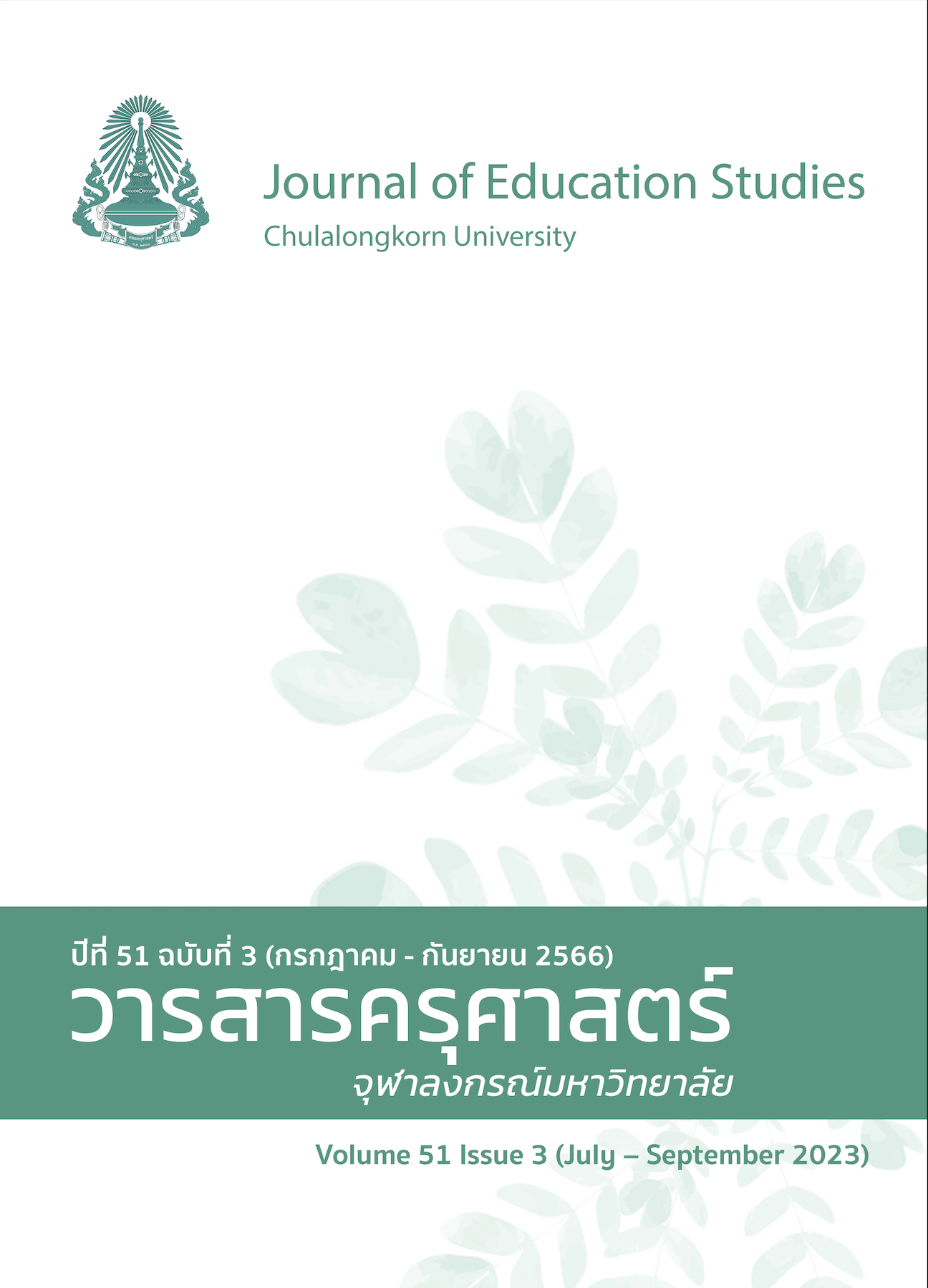Confirmatory Factor Analysis of Self-directed Learning of Undergraduate Students at Faculty of Education, Ramkhamhaeng University
DOI:
https://doi.org/10.14456/educu.2023.24Keywords:
self-directed learning, confirmatory factor analysisAbstract
Individuals with self-directed learning can develop maturity and adaptability for change, contributing to the development of lifelong learning skills. In this research, the researcher examines (1) the self-directed learning behaviors of undergraduate students at the Faculty of Education, Ramkhamhaeng University; and analyzes (2) the confirmatory factors of self-directed learning of the undergraduate students under study. The study was conducted with the sample population of 580 subjects using the technique of stratified random sampling. Data were analyzed using second order confirmatory factor analysis.
Findings are as follows. (1) The undergraduate students under investigation exhibited self-directed learning behaviors at a high level (M=4.22, SD=.494). (2) The structural model of the self-directed learning factors of the undergraduate students under study consisted of six factors i.e. self-management; desire for learning; self-control; learning strategies; motivation; and awareness which were in consonance with the empirical data (χ2=715, df=201, p=.981, TLI=0.913, RMSEA=0.044, SRMR=0.040).
References
กระทรวงศึกษาธิการ. (6 มีนาคม 2562). เอกสารแนบท้าย ประกาศกระทรวงศึกษาธิการ เรื่อง มาตรฐานคุณวุฒิระดับปริญญาตรี สาขาครุศาสตร์และสาขาศึกษาศาสตร์ (หลักสูตรสี่ปี) พ.ศ. 2562. http://www.ratchakitcha.soc.go.th/DATA/PDF/2562/E/056/T_0012.PDF
ทิศนา แขมมณี. (2553). ศาสตร์การสอน : องค์ความรู้เพื่อการจัดกระบวนการเรียนรู้ที่มีประสิทธิภาพ (พิมพ์ครั้งที่ 13). สำนักพิมพ์แห่งจุฬาลงกรณ์มหาวิทยาลัย.
สำนักงานเลขานุการของคณะกรรมการยุทธศาสตร์ชาติ สำนักงานคณะกรรมการพัฒนาการเศรษฐกิจและสังคมแห่งชาติ. (13 ตุลาคม 2561). ยุทธศาสตร์ชาติ พ.ศ. 2561-2580. https://www.ratchakitcha.soc.go.th/DATA/PDF/2561/A/082/T_0001.PDF
สำนักงานส่งเสริมการศึกษานอกระบบและการศึกษาตามอัธยาศัย. (2551). คัมภีร์ กศน. สำนักงานส่งเสริมการศึกษานอกระบบและการศึกษาตามอัธยาศัย
อาชัญญา รัตนอุบล. (2559). การเรียนรู้ของผู้ใหญ่และผู้สูงอายุในสังคมไทย. สำนักพิมพ์แห่งจุฬาลงกรณ์มหาวิทยาลัย.
Acar, C. Kara, I. & Ekici, F. T. (2015). Development of Self Directed Learning Skills Scale for Pre-Service Science Teachers. International Journal of Assessment Tools in Education, 2(2), 3-13.
Ayyildiz, Y. & Tarhan, L. (2015). Development of the self-directed learning skills scale. International Journal of Lifelong Education, 34(6), 663-679.
Behar-Horenstein, L. S. Beck, D. E. & Su, Y. (2018). An Initial Validation Study of the Self-Rating Scale of Self-Directed Learning for Pharmacy Education. American Journal of Pharmaceutical Education, 82(3), 280-286.
Cadorin, L. Ghezzi, V. Camillo, M. & Palese, A. (2017). The self-rating scale of self-directed learning tool: findings from a confirmatory factor analysis. Journal of Nursing Education and Practice, 7(2), 31-37.
Fisher, M. J. & King, J., G. (2010). The self-directed learning readiness scale for nursing education revisited: A confirmatory factor analysis. Nurse Education Today, 30(1), 44-48.
Fisher, M. King, J. & Tague, G. (2001). Development of a self-directed learning readiness scale for nursing education. Nurse Education Today, 21(2), 516-525.
Griffin, C. (1983). Curriculum theory in adult and lifelong education. New York: Nichols.
Guglielmino, L. M. (1978). Development of the self-directed learning readiness scale. (Doctoral dissertation, University of Georgia, 1977). Dissertation Abstracts International, 38, 6467A.
Hair, J. F., Black, W. C., Babin, B. J., & Anderson, R. E. (2010). Multivariate Data Analysis (7th Edition). Pearson: New York.
Knowles, M. S. (1975). Self-Directed Learning: A guide for learners and teachers. New York: Association Press.
Lee, C. Yeung, A. S. & Ip, T. (2017). University English language learners' readiness to use computer technology for self-directed learning. System, 67, 99-110.
Ramli, N. Muljono, P. & Afendi, F. M. (2018). External Factors, Internal Factors and Self-Directed Learning Readiness. Journal of Education and e-Learning Research, 5(1), 37-42.
Skager, R. (1978). Lifelong Education and Evaluation Practice. Oxford: Frankfurt Unesco Institute for Education.
Suh, H. N. Wang, K. T. & Arterberry, B. J. (2014). Development and Initial Validation of the Self-Directed Learning Inventory with Korean College Students. Journal of Psychoeducational Assessment, 33(7), 687-697.
Tough, A. (1971). The adult’s learning projects: A fresh approach to theory and practice in adult learning. Toronto: OISE (The Ontario Institute for Studies in adult Education).
Zhu, M. Bonk, C. J. & Doo, M. Y. (2020). Self-directed learning in MOOCs: exploring the relationships among motivation, self-monitoring, and self-management. Educational Technology Research and Development, 68(5), 2073–2093.
Downloads
Published
How to Cite
Issue
Section
License

This work is licensed under a Creative Commons Attribution-NonCommercial-NoDerivatives 4.0 International License.




